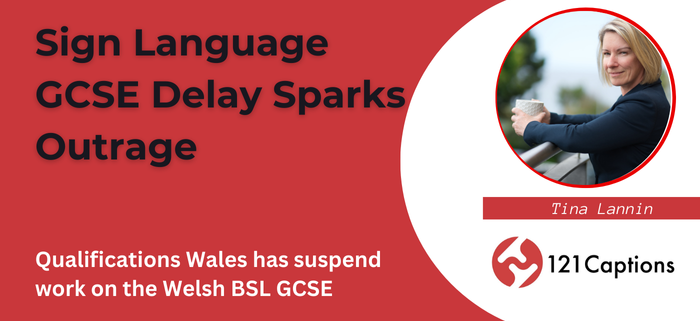Sign Language GCSE Delay Sparks Outrage
Sign Language GCSE Delay Sparks Outrage
Two years ago, we wrote about how a GCSE in British Sign Language was on the horizon. Then, a year later, we reported that the Government announced the content for the new qualification, scheduled for the exam board syllabus approval from September 2025.
Unfortunately, things look to have taken a step backwards, with the news that the development of a British Sign Language (BSL) GCSE for Wales has been suspended. Qualifications Wales announced the “difficult decision” to suspend work on the Welsh BSL GCSE, citing “significant practical challenges” as the reason for halting progress.
Advocacy groups lead the backlash
The British Deaf Association (BDA) has expressed “anger,” while the National Deaf Children’s Society (NDCS) and Signature have voiced “disappointment” over the news. Adding to the frustration, it was also confirmed that England’s BSL GCSE, initially set to launch in September 2025, will likely face delays.
This decision has left deaf advocates questioning the commitment to making BSL accessible and formally recognised within the education system.
Martin Griffiths, BDA Cymru Manager, described the news as “a slap in the face” for deaf children and their peers across Wales. He pointed out that this decision directly contradicts the Welsh Government’s recent commitment to supporting sign language. “The Welsh Government had made a strong commitment to sign language, just yesterday in the Senedd,” he said. “We urgently need a BSL Act in Wales to ensure that all parts of the Welsh Government are actively promoting the use of British Sign Language.”
Backstabbed by the government
Susan Daniels OBE, Chief Executive of the National Deaf Children’s Society, highlighted that deaf young people have campaigned for a BSL GCSE for more than a decade. Daniels stated, “To now be told that the Welsh Government has gone back on its word and there will no longer be a BSL GCSE in Wales is devastating.
“It was only yesterday that Cabinet Secretary for Social Justice Jane Hutt spoke of the ‘provisions’ being made by the Government to ‘promote and facilitate the use of BSL’ in Wales.”
Daniels underlined the importance of a formal BSL qualification, emphasising that “more people knowing and using BSL is key to breaking down the barriers some deaf young people face.” The NDCS remains committed to working with Qualifications Wales to tackle the “practical challenges” and make a BSL GCSE a reality.
Still fighting
Signature’s Executive Director, Lindsay Foster, shared her disappointment, noting the considerable effort that has already gone into developing this qualification. “We will be sharing with Qualifications Wales our research on the demand for a GCSE in BSL, as well as the evidence of sufficient teaching supply in Wales for launch,” she said. Signature has been an active member of the GCSE Coalition group and remains committed to making a BSL GCSE feasible.
The delays aren’t limited to Wales. In England, hopes for a BSL GCSE starting in September 2025 have also been dampened.
Following a meeting between Signature and Ofqual (the Office of Qualifications and Examinations Regulation), Lindsay Foster admitted that the 2025 start date is now “unrealistic” due to how much work remains to be done. “Although the delay may be frustrating, it is important that this qualification is right and meets the needs of those who will be taking it,” she added.
Susan Daniels of the NDCS echoed this disappointment for English students, calling the situation “incredibly frustrating” for young people who have campaigned tirelessly. For some students, the delays mean they may age out before they have the opportunity to achieve a BSL GCSE. Nevertheless, Daniels reaffirmed that the NDCS is as committed as ever to making the BSL GCSE a reality, not only in England and Wales but throughout the UK.
For now, deaf advocacy groups and young campaigners remain resolute. Their commitment to achieving a recognised qualification in British Sign Language continues, with calls for governments in both Wales and England to recognise the importance of BSL as a language, a right, and a bridge to inclusivity.




Leave a Reply
Want to join the discussion?Feel free to contribute!